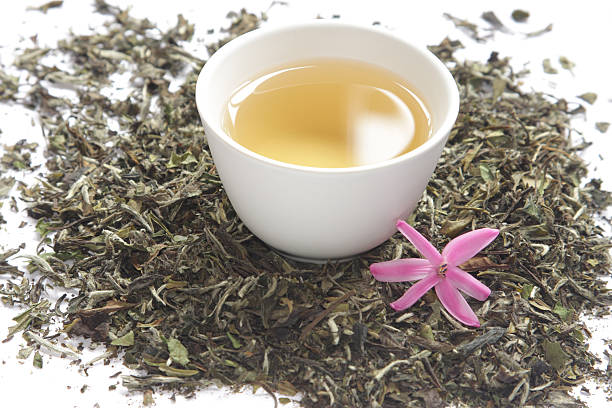
Intro
In the realm of teas, white tea often remains a mystery to many.
Known for its delicate flavor and minimal processing, it raises the question: does white tea have caffeine?
This post dives deep into the world of white tea, exploring its caffeine content, health effects, and more.

Understanding White Tea and Its Unique Qualities
White tea originates from the Camellia sinensis plant, just like black and green teas. Unlike its counterparts, harvesters pick white tea at a younger stage, focusing on young leaves and buds.
This early harvest and minimal processing contribute to its distinct, light flavor profile. White tea’s delicate nature often leads people to wonder, does white tea have caffeine?
Despite its subtle flavor, it indeed contains caffeine, albeit in lesser amounts compared to black and green teas.
This unique combination of light taste and lower caffeine content sets white tea apart, making it a favored choice for those seeking a milder tea experience.

The Caffeine Content: Does White Tea Have Caffeine?
Absolutely, white tea does contain caffeine. The levels are lower than those found in black and green teas.
Factors such as the tea variety, growing conditions, and brewing method influence the caffeine content.
Typically, an 8-ounce cup holds between 15 to 30 milligrams of caffeine. This makes white tea a milder option for individuals looking to reduce caffeine intake.
It’s crucial to remember that brewing techniques can alter caffeine levels. Shorter brewing times and lower water temperatures can further decrease the amount of caffeine in your cup.
This flexibility allows tea drinkers to adjust their caffeine consumption to their personal preferences.

Health Effects of White Tea: The Good and the Bad
White tea boasts impressive health benefits. It contains high antioxidant levels, fighting off oxidative stress and reducing inflammation.
These antioxidants can also lower heart disease risk and aid in weight loss efforts.
Despite its benefits, white tea does have caffeine.
Individuals sensitive to caffeine should thus enjoy white tea in moderation. This cautious approach will help avoid potential side effects like jitteriness or disrupted sleep.
Overall, white tea presents a balanced option for those seeking both health perks and a gentler caffeine experience.

Comparing Caffeine Levels in White, Green, and Black Teas
- Black tea leads the pack with 40 to 70 milligrams of caffeine per 8-ounce serving.
- Green tea follows, offering 20 to 45 milligrams.
- White tea contains the least, with just 15 to 30 milligrams.
This hierarchy places white tea as the ideal choice for those reducing their caffeine intake.
Each type, from black to white, caters to different preferences and needs, allowing tea lovers to select their ideal caffeine level.
This choice empowers individuals to manage their caffeine consumption effectively, aligning with their personal health goals and taste preferences.

The Impact of Caffeine: Understanding Its Effects
Caffeine stimulates the nervous system, boosting alertness and energy. In moderation, it enhances focus and physical performance. However, it’s not all positive.
Some individuals may experience jitteriness and anxiety after consuming caffeine. It also has the potential to disrupt sleep patterns.
Knowing your caffeine tolerance is key. This knowledge allows you to enjoy white tea and its benefits without facing the downsides.
Tailoring your caffeine intake according to your body’s response helps maintain a healthy balance.

Debunking Myths About White Tea
One widespread myth incorrectly claims that white tea is caffeine-free.
We’ve established that white tea does indeed contain caffeine, although in smaller amounts than its black and green counterparts.
Another misconception suggests that white tea lacks the health benefits of green or black tea due to its lower caffeine content.
However, white tea is a powerhouse of antioxidants, offering several health advantages.
It’s essential to recognize that caffeine content does not directly correlate with the health benefits a tea can provide.
Contrary to these myths, white tea holds its own as a nutritious and beneficial beverage choice.

Brewing Tips to Manage Caffeine Intake
To control the caffeine in your white tea, consider adjusting how you brew it. Shortening the brew time significantly reduces caffeine extraction. Use cooler water, not boiling, to lower caffeine levels even more.
Experiment with these variables to fine-tune your cup’s caffeine content.
This approach lets you enjoy white tea’s subtle flavors without a strong caffeine kick.
Remember, each person’s ideal brewing method will vary, so don’t hesitate to adjust until you find your perfect balance.

White Tea for Everyone? Considerations Before Indulging
White tea appeals to many for its health benefits and lower caffeine content. However, not everyone should dive in without caution.
Pregnant and nursing individuals must seek medical advice before including white tea in their diet.
Those with caffeine sensitivities should also proceed carefully. It’s vital to monitor your total caffeine intake from all sources, including white tea.
This ensures you stay within safe consumption limits.
Remember, while white tea can be a delightful addition to your routine, personal health conditions and caffeine tolerance play a crucial role in determining its suitability for you.

The Verdict: Should You Drink White Tea?
Choosing to drink white tea depends on your personal taste and health considerations. If you prefer a gentle, less caffeinated beverage, white tea is a smart pick.
Its health advantages, including a rich antioxidant profile, cater to those seeking wellness benefits.
However, it’s important to gauge your caffeine sensitivity. Moderation remains key, especially for individuals with certain health conditions or those pregnant or nursing.
Adjust brewing techniques to tailor caffeine levels to your preference.
In essence, white tea can be a great addition to your routine, aligning with mindful consumption and health objectives.

TLDR
White tea does indeed contain caffeine, though in smaller quantities than black and green teas. It’s rich in antioxidants, offering several health perks.
Those sensitive to caffeine should drink it cautiously.
White tea serves as a healthier, milder caffeine option for many. Adjust your brewing method to manage caffeine levels effectively.
It suits those seeking a less caffeinated, yet beneficial beverage choice.

Learn more about “Kudzu Tea”
